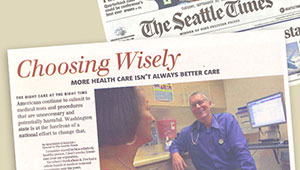Science doesn’t have to be sexy to save lives

Prevention can save more lives from cancer than treatment does. Dr. Jennifer McClure tells how you can support such research and help stop deadly disease—before it starts.
In December, the National Cancer Institute (NCI) released its 2016 annual plan and budget proposal. The document provides compelling evidence for the value of our nation’s investment in cancer research. For example, the overall cancer death rate in the United States fell by 22 percent from 1990 to 2011. Why? A major driver is reduced tobacco use. Also, more Americans now survive cancer—twice as many as did just 20 years ago.
These changes did not happen by chance. They were driven by advances in medicine and public health —advances grounded in federally funded biomedical and behavioral research.
The NCI report also highlights an often-overlooked and underappreciated fact: Prevention can save more lives from cancer than treatment does. This truth, as NCI states, underlines the importance of strongly supporting research on prevention. We know what causes most cancer, but we have not mastered how to prevent it. For example, if people would stop smoking or change their diet and other lifestyle risk factors, far fewer would suffer or die from cancer. But making and sustaining these changes is not easy. People need help with this, which is why many of my colleagues and I have devoted our careers to research in health behavior. It may not be as sexy as studying cancer genomics or pencil-beam scanning (a form of proton therapy), but helping people make practical lifestyle changes has the potential to save more lives than the most cutting-edge cancer therapies. It’s nice to see this acknowledged by NCI.
But NCI’s report also offers a sobering look at the present and future of biomedical and behavioral research funding. Since 2003, with the exception of research funding provided through the 2009 federal stimulus package, there has been a decade-long hiatus in the nation’s investment in research. At the same time, the cost of biomedical research has steadily risen, while NCI has lost nearly 25 percent of its budget in constant dollars due to inflation. In other words, research costs are going up and available public money to support research is going down. That translates to fewer studies and fewer discoveries. In human terms, that means countless more people will develop, suffer from, and even die from cancer than would if Congress had not essentially reversed the course of our national investment in research over the last decade. And all of this when worldwide cancer deaths are expected to increase 39 percent from 2012 to 2025.
So, what can be done about this?
I admit I often feel powerless to make a difference as only one person. But as a nation of individuals there is a lot we can do:
- If you believe biomedical and behavioral research are good uses of our public resources, let your representatives in Congress know. Call, tweet, or e-mail them at http://writegov.com. It’s never been so easy to make your voice heard.
- Put your money where your heart is. Consider a charitable donation to a reputable foundation or research institute to directly support their work. Private-donor funds are often the only resources available to seed new areas of research. This money supports critical demonstration and proof-of-concept studies that are necessary to compete for public funds that, in turn, support the larger trials necessary to demonstrate an intervention’s safety and effectiveness. And while it may sound cliché, every dollar that goes to support research really does make a difference. I have seen countless examples of small investments that set in motion larger research programs that ultimately resulted in nationwide changes in public health policy or care.
- Finally, consider volunteering as a research participant. Most every medical discovery relies on the generous participation of volunteers. Each year, hundreds of thousands of Americans voluntarily take part in medical research.
For me, I will continue to do each of these. Additionally, my colleagues and I will continue thinking about practical ways to prevent cancer and chronic disease. Some of these ideas will receive the funding necessary to test them and some will not. Of those funded, some will prove effective, and some will not. It takes perseverance to be a public health scientist, but as NCI reminds us, at least your research doesn’t have to be sexy to save lives.
Jennifer McClure, PhD
Director of Research, Faculty, & Development and Senior Investigator
Group Health Research Institute



